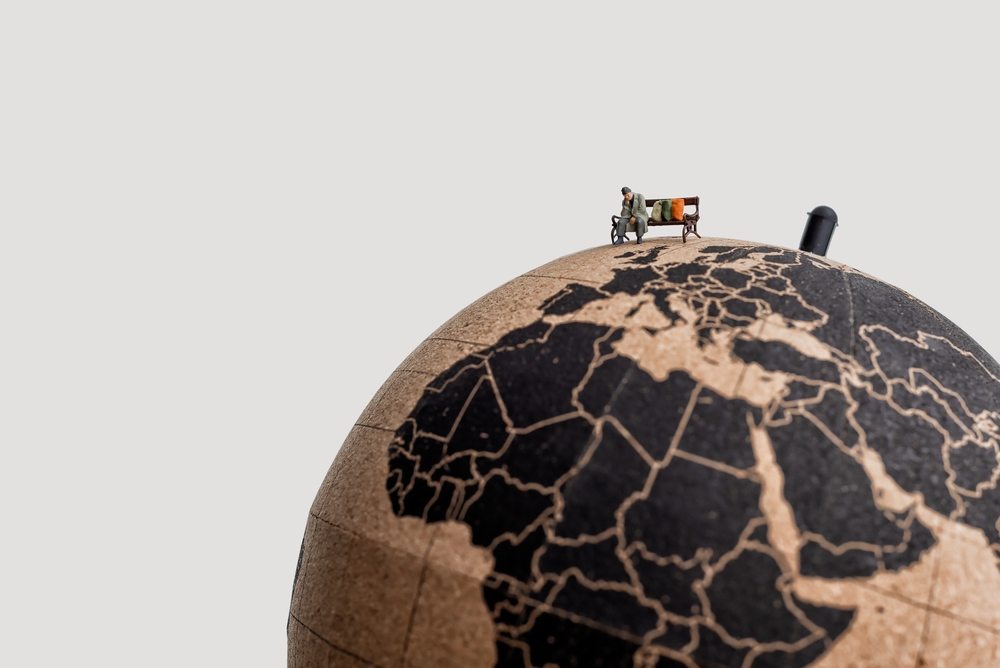This year’s Nobel Prize in Economic Sciences has been awarded to Daron Acemoglu (MIT), Simon Johnson (MIT), and James A. Robinson (U of Chicago) for their work investigating why some countries flourish while others don’t. It’s an especially interesting time to be asking this question: While most of humanity has lived in extreme global poverty—by contemporary standards—for hundreds of thousands of years, most of us today have moved up and out. And much of that progress has happened in just the past quarter century. Of the world’s population in 2024, roughly one billion remain in such poverty—as highlighted in the title of Paul Collier’s The Bottom Billion.
Yet the progress that has been made is breathtaking. We should celebrate every single day the ongoing eradication of grinding poverty across the globe. But it hasn’t happened everywhere. At least not yet. And this year’s laureates make both theoretical and empirical cases that institutions really do matter: Where one finds economic freedom and the rule of law, one is more likely to find prosperity than poverty.
But we all know that. So why the prize?
The new laureates, who will split the roughly $1 million award, take a step back and ask why these powerful institutions were more likely to develop in some places rather than others. After all, if good institutions make nations rich, why doesn’t every nation choose to build them?
The laureates’ findings? Different institutional outcomes today are the legacy of the different ways in which European colonizers introduced—or didn’t introduce—such institutions, as well as the reasons.
In broad and sweeping terms, the laureates suggest that today’s countries with dense populations and abundant natural resources are less likely to enjoy the benefits of rule of law and economic freedom because of the economic incentives faced by their colonizers. And one is more likely to find a legacy of better governance and institutions in less populated places that have few extractive industries.
But the history of colonization alone cannot explain why modern societies don’t simply throw off the legacy of colonial exploitation and make a change for the better. If heavy-handed exploitative rule is bad, why don’t the governed today replace it with something better?
A famous puzzle in the literature of economic development is sometimes referred to as the “natural resource curse”: The countries richest in the most valuable commodities in the world—typically extractive resources like diamonds, gold, etc.—are most likely to be poor. Shouldn’t a country rich in valuable resources be among the richest?
One common argument suggests that because the immediate economic gains from extractive industries are cheap and easy and create lots of local employment, those countries never developed a more entrepreneurial culture simply because they never needed to. In short, the opportunity cost of easy wealth from diamonds or gold is the entrepreneurship that didn’t happen. In addition, the incentives to pursue higher education with distant and uncertain rewards seem small when you can make money right now in your country’s extractive industries.
While the laureates’ work doesn’t contradict such explanations, it does augment and enrich our understanding of them.
To enrich our understanding of the resource curse, Acemoglu, Johnson, and Robinson point out that colonization didn’t unfold the same way everywhere. Instead, facing economic incentives particular to each time and place, colonizers chose to develop, or not develop, prosperity-driving institutions like economic freedom and the rule of law. Two caricatures of institutional development emerge.
In the first caricature, where few colonizers arrive, local populations are dense and extractive resources are abundant. In such situations, European settler-extractors build institutions that make sense in that context: Exploit the people and the natural resources and create institutions that are expedient to that end. Allowing too much individual agency among the indigenous people will get in the way of the immense potential economic rewards, so why allow it? The laureates also suggest that colonizers were, ceteris paribus, less likely to relocate to regions where deadly diseases were prevalent, so they had little incentive to pursue and develop such institutions because so few would be governed by them.
In the happier caricature, colonizers adopt and develop essential institutions, and leave a legacy that persists today. But why? And where? Again, the key lies in whether the density of European colonizers was big or small relative to the local population, whether extractive resources were abundant or scarce, and whether a particular place was perceived to me more or less dangerous in terms of disease and other factors affecting life expectancy.
As noted earlier, European settlers were more likely to develop good institutions when they were likely to benefit from them personally. And settlers were more likely to develop good institutions when they themselves would be most immediately impacted by them. Thus, colonies of settlers often arose in regions with fewer indigenous people present and fewer extractive industries that required lots of exploitation and heavy-handed governance to make it happen.
Thus, the findings of this year’s winners enrich our understanding of the natural resource curse. Countries that were already rich 500 years ago were ripe for exploitation, and humane institutions got in the way of such exploitation. On the other hand, colonizers looking to start new lives for themselves were likely to choose settings conducive to that and create institutions conducive to their long-term flourishing.
An obvious question emerges: If everyone knows that institutions matter, and that some institutions are much better than others for human flourishing, why doesn’t every country turn the page—regardless of its colonial baggage—and choose the path of economic freedom and rule of law?
The short answer is that institutions have inertia, and regime change is much harder than changing your socks.
First, as Lord Acton has said, “Power tends to corrupt.” And those currently in power are, understandably, reluctant to surrender power. Why would we expect a 21st-century ruthless dictator in an extractive economy to behave better than their European predecessors did in the same circumstance? As Mel Brooks reminds us, “It’s good to be the king”—especially when abuse of your present power enriches your pockets and you have a strong military that will snuff out any hint of rebellion.
Second, military power isn’t the only means of forestalling rebellion. As 2015 economics Nobel winner Angus Deaton makes clear, short-term appeasement of an unruly population can stave off rebellion. The appeasement can take several forms. For instance, the incumbent rulers might engage in their own form of virtue signaling. We sometimes see this take the form of using the months before a national election to pursue (finally) a few very visible public works projects like fixing roads or planting trees in a big city. The bad politician hopes the voters see these activities as harbingers of real reforms, knowing that he can continue being neglectful once his reelection is sure.
A bad ruler can also give away stuff. Sometimes voters are willing to overlook the greatest atrocities if you make it up to them with gifts like refrigerators and below-cost gasoline (cf. Venezuela).
Finally, as Deaton notes, winning generous foreign aid for your people can potentially mitigate an uprising. But this strategy creates perverse incentives for the incumbent ruler in a poor country. In the absence of such aid, rulers would need to be more accountable to their citizens or they would be overthrown. But foreign aid is something bad rulers can point to as an “accomplishment.” And the only way an incumbent can continue to qualify for aid is to make sure the country stays poor. Rich countries don’t get foreign aid.
In short, reform is hard. And the hangover of bad colonialism doesn’t seem to have easy remedies.
While the work of this year’s laureates helps us understand why some countries remain poor while most others got rich, it offers little in the way of a path forward. Even when a nation demands more of its rulers, the incumbents can simply offer a bit of appeasement sufficient to make outright rebellion less likely. Even in otherwise free and rich countries, incumbent rulers cannot be trusted always to be benevolent: Remember Lord Acton.
Further, policymakers cannot be trusted to make decisions in the long-term best interests of those they govern. Elections have consequences even in rich countries, so politicians everywhere are more likely to pursue policies that ensure reelection first and foremost—even if those policies are bad medicine economically. This is the legacy of the field of economics known as public choice, for which James Buchanan received the Nobel in 1986: Politicians are utility-maximizers, just like the rest of us, and if you want to know what a politician is likely to do, just ask what’s most popular, not what’s best. And sometimes it’s OK to use your power once elected to do unpopular things you never would have suggested prior to election day.
This observation seems to be what is driving Deirdre McCloskey’s reflection on this year’s Nobel in her weekly column in Brazil’s Folha de São Paulo, “A Statist Nobel.” While McCloskey doesn’t dispute the findings of the laureates, she singles out Acemoglu for his willingness to use the power of the state to do “good things.” She quotes Acemoglu and Johnson: “Government subsidies for developing more socially beneficial technologies are one of the most powerful means of redirecting technology in a market economy.”
Because the laureates this year have been almost universally praised, it’s worth examining McCloskey’s somewhat critical view.
This suggestion, that the power of the state can, and should, be deployed to frustrate individual agency in a market economy, is indeed troubling. And it contradicts the wisdom found in Friedrich Hayek’s 1945 essay “The Use of Knowledge in Society.” Hayek masterfully argues that the planning carried out by each of us in a decentralized economy trumps any economic planning attempted by a government that lacks the particular information known only to each of us in our specific circumstances.
Acemoglu and Johnson want us to believe that the personal agency found in the market system results in a misallocating of resources, and that the powerful need to create false incentives to get people to make choices for themselves different from those they might otherwise make—allegedly for the sake of the greater good.
But getting onboard with Acemoglu and Johnson requires three pretty strict assumptions: (1) it’s OK to make people a little worse off today if you do it for a good reason, (2) you know for certain that your plan will result in a better outcome than would otherwise be the case, (3) imposing your will on others is acceptable under the right conditions.
But as the French economist Frédéric Bastiat famously observed, once a government uses its powers of coercion and taxation to impose its will on others, we can never see what outcome we might have observed otherwise.
Obviously, lots of exploitation through political power is wrong, and the laureates help us understand how it develops and why it persists. But how comfortable we are with a little exploitation by the powerful is a question we should always bear in mind.

